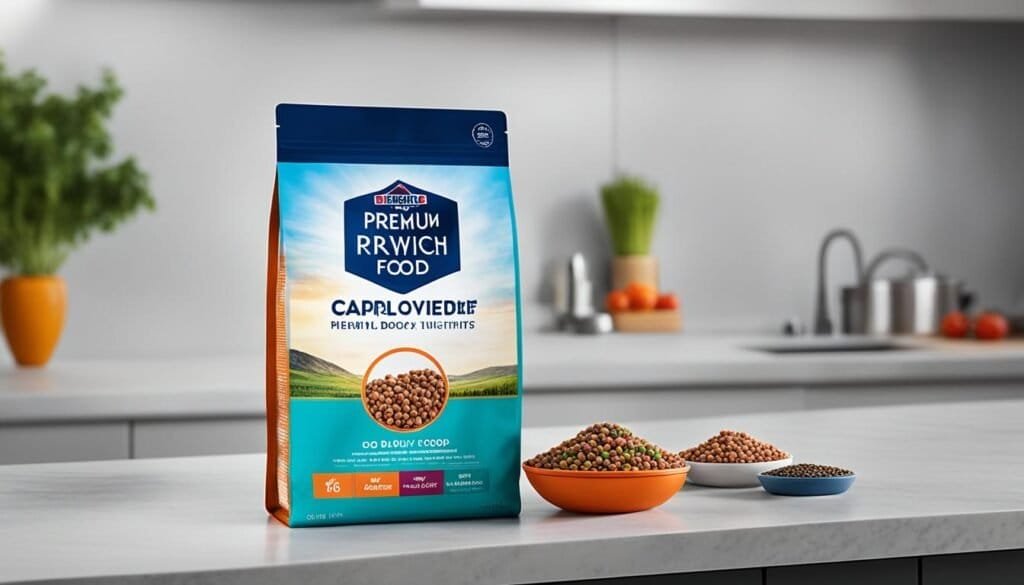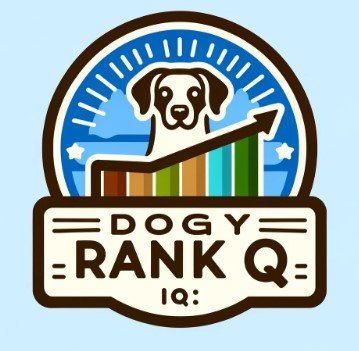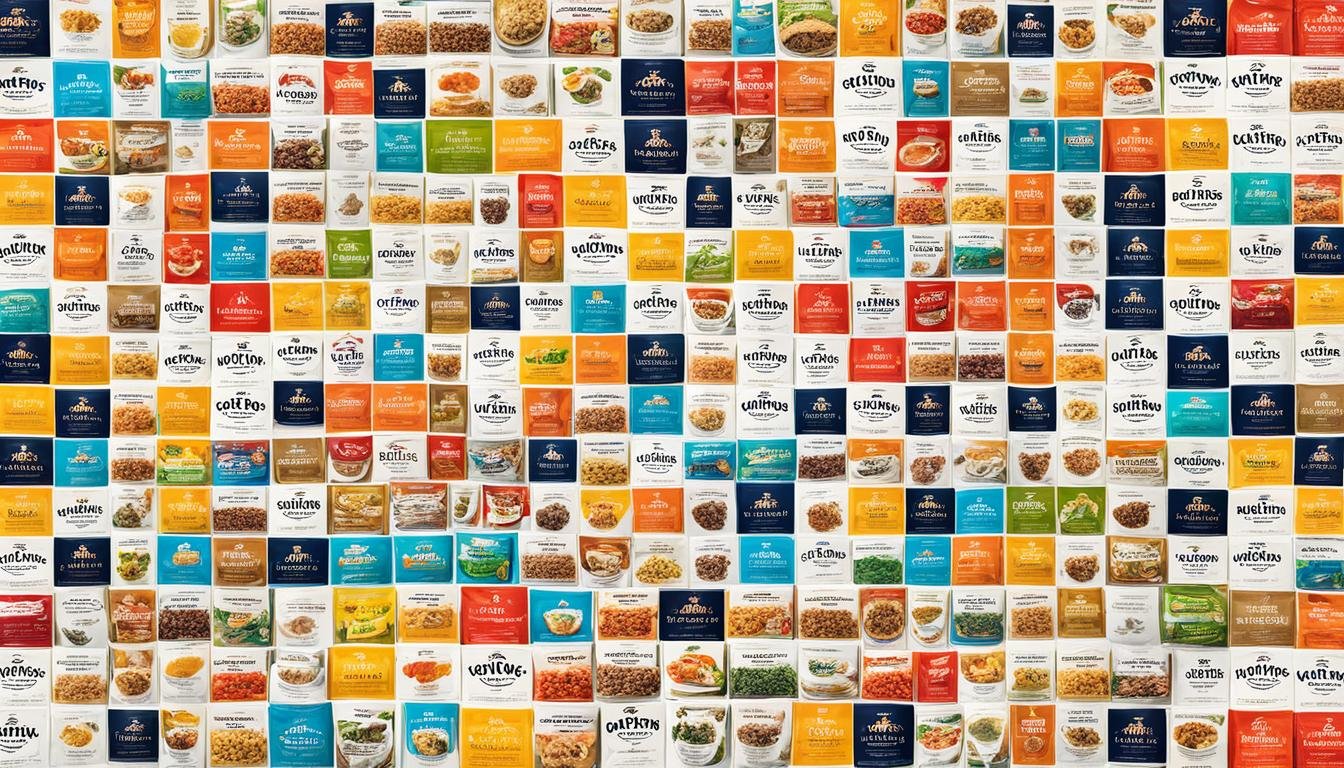Did you know that 10 out of 13 veterinarians consulted for this article prefer Royal Canin dog food for their own pets and the dogs they treat? With so many options on the market, finding the premium dog nutrition that’s right for your canine companion can be a daunting task. Fear not – this comprehensive guide will reveal the vet-recommended dog food brands that cater to your dog’s unique canine dietary requirements.
Picking the perfect dry dog food is a delicate and individualized process that can make all the difference between a happy, healthy pup and a sick one. Experts consider several crucial factors when recommending the best dry dog food, including the pet food quality standards set by the Association of American Feed Control Officials (AAFCO), as well as your dog’s size, age, and preferences.
Whether you’re seeking holistic pet nutrition options, grain-free dog food formulas, or dog breed-specific diets, this article has got you covered. We’ll dive into the dog food ingredient analysis and uncover the top veterinary pet food recommendations to ensure your furry friend thrives.
Key Takeaways
- Veterinarians overwhelmingly prefer Royal Canin dog food for their own pets and canine patients.
- Choosing the right dry dog food requires considering factors like AAFCO standards, size, age, and your pet’s preferences.
- Experts recommend looking for high-quality protein sources and evaluating carbohydrate ingredients when selecting a dog food.
- Premium dog food brands like Royal Canin and Purina Pro Plan offer specialized formulas for different breeds and life stages.
- Wet, dehydrated, and raw dog food options can also be beneficial, providing additional hydration and nutritional benefits.
Understanding Your Dog’s Nutritional Needs
As a responsible pet owner, understanding your dog’s canine dietary requirements is crucial to ensuring their overall health and well-being. The most important agency in ensuring the safety and adequacy of pet foods is the Association of American Feed Control Officials (AAFCO), which sets strict pet food quality standards and tailors recipes for every stage of a dog’s life.
Adhering to AAFCO Standards
Pet owners can find the AAFCO’s seal of approval on the label of their dry dog food or on the manufacturer’s website, indicating that the product has been tested for dog food ingredient analysis and meets the organization’s nutritional guidelines. This stamp of approval assures you that the food is complete and balanced for your furry companion.
Considering Age and Breed Size
It’s important to note that different dog breeds have varying nutritional requirements based on factors like size, metabolism, and activity level. Puppies, adults, and senior dogs also have distinct veterinary pet food recommendations to address their unique nutritional needs at each life stage. Consulting with your veterinarian can help you determine the best diet for your individual dog’s age and breed characteristics.
Decoding Dog Food Labels
When it comes to pet food quality standards and dog food ingredient analysis, deciphering the information on dog food labels is crucial. The first ingredient on the label represents the primary ingredient by weight, so it’s important to look for high-quality protein sources like chicken or salmon as the first listed item. While corn is not necessarily harmful for dogs, it can make protein harder to digest in larger quantities, so a brand like IAMS that has chicken as the first ingredient is a reputable option that adheres to AAFCO guidelines.
Identifying Quality Protein Sources
The 95% Rule states that at least 95% of a dog food product must be the named ingredient, like “Chicken for Dogs” or “Salmon Dog Food.” This ensures that your pup is getting a significant amount of the protein source listed on the label. Additionally, the 25% Rule requires that if the named ingredients comprise at least 25% but less than 95% of the product, a qualifying term like “dinner,” “entrée,” or “platter” must be included in the product name.
Evaluating Carbohydrate Ingredients
When it comes to grain-free dog food formulas, it’s important to look beyond just the protein source and examine the carbohydrate ingredients as well. The “With” Rule specifies that the ingredient following “with” needs to be at least 3% of the product, so if a label says “Beef Flavor Dog Food,” the product must contain a detectable amount of beef. Additionally, many states require dog food labels to display the percentage of crude protein, crude fat, crude fiber, and water in the Guaranteed Analysis section, providing valuable insights into the overall nutritional profile of the food.
| Regulation | Requirement |
|---|---|
| 95% Rule | At least 95% of a dog food product must be the named ingredient |
| 25% Rule | If named ingredients are 25-95% of product, a qualifying term like “dinner” or “entrée” must be used |
| “With” Rule | Ingredient following “with” must be at least 3% of the product |
| Flavor Rule | If label says “Beef Flavor,” product must contain a detectable amount of beef |
| Guaranteed Analysis | Many states require displaying crude protein, fat, fiber, and moisture percentages |
The Best Dog Food for Your Pet, According to Vets

When it comes to finding the perfect vet-recommended dog food brands for your furry friend, veterinarians have a wealth of knowledge and expertise to share. According to the first source, these professionals provide invaluable veterinary pet food recommendations to ensure your pet’s nutritional needs are met.
The first source offers a comprehensive list of the best dry dog food options, as suggested by veterinarians. For those seeking a bargain dry dog food, IAMS Adult Minichunks Small Kibble High Protein Dry Dog Food with Real Chicken is a top pick. Nutro Natural Choice Adult Dry Dog Food is recommended for dogs who need a boost in coat softness and shine. And for owners of large breed pups, Hill’s Science Diet Adult Large Breed Dry Dog Food is the veterinarians’ choice.
If you have a small dog at home, Eukanuba Adult Small Bites Dry Dog Food is the vet-recommended dog food that caters specifically to their nutritional needs. Regardless of your pup’s size or breed, these vet-recommended dog food brands are sure to provide a balanced and complete diet for your beloved companion.
Premium Dry Dog Food Options

When it comes to premium dog nutrition, veterinarians and dog owners alike often turn to reputable brands like Royal Canin and Purina Pro Plan. These vet-recommended dog food brands not only adhere to the highest quality standards but also offer specialized formulas tailored to specific dog breed-specific diets.
Royal Canin: Breed-Specific Formulas
Royal Canin is a standout in the premium dog food market, renowned for its peer-reviewed research and commitment to crafting specialized formulas for different dog breeds. The brand’s breed-specific diets are designed to cater to the unique nutritional needs and preferences of each canine breed, ensuring optimal health and well-being. By sourcing ingredients that dogs find highly palatable, such as chicken and chicken fat, Royal Canin’s formulas are not only nutritious but also irresistible to your furry companion.
Purina Pro Plan: High-Protein Blends
Another trusted vet-recommended dog food brand is Purina Pro Plan, which offers a range of high-quality, high-protein dry dog food options. These formulas are meticulously crafted to provide your dog with the premium dog nutrition they need to thrive, with a focus on delivering optimal nutrient levels and supporting overall health and wellness. Whether your canine companion is an active working dog or a beloved family pet, Purina Pro Plan has a specialized blend to meet their unique dietary requirements.
Exploring Wet and Fresh Dog Food Diets
As you navigate the world of dog nutrition, you’ll find that both dry and wet food can be excellent choices, each with their unique advantages. One key benefit of canned or wet dog food is the significantly higher moisture content compared to kibble, which can be especially beneficial for pups who may be reluctant drinkers or have conditions that warrant a moisture-rich diet.
Canned Dog Food for Hydration
Wet food can be a great option for holistic pet nutrition options, as it provides ample hydration to keep your canine companion well-hydrated. This can be particularly helpful for dogs with certain medical conditions, such as kidney disease or urinary tract issues, where increased fluid intake is essential. Additionally, the texture and aromatic appeal of canned dog food may entice picky eaters to enjoy their meals more enthusiastically.
Dehydrated and Raw Dog Food Alternatives
Beyond traditional canned and kibble options, pet owners are increasingly exploring dehydrated and raw dog food alternatives as part of their quest for grain-free dog food formulas and more holistic nutrition. Dehydrated dog food, for example, retains much of the nutritional value of raw ingredients while offering the convenience of shelf-stable storage. Raw diets, though requiring more preparation, can offer benefits such as shinier coats, healthier skin, improved dental health, and increased energy for some dogs. However, the American Veterinary Medical Association cautions that raw diets carry risks and should be approached with guidance from veterinary professionals.
Ultimately, the decision between dry, wet, dehydrated, or raw dog food should be made in consultation with your veterinarian, taking into account your pup’s unique nutritional needs, health status, and individual preferences. By exploring the wide array of holistic pet nutrition options, grain-free dog food formulas, and dehydrated and raw dog food alternatives, you can find the best fit for your four-legged friend’s well-being.
Conclusion
This comprehensive guide has provided a wealth of insights from veterinary experts on selecting the best dog food for your furry companion. From understanding your dog’s unique nutritional requirements based on age, breed size, and activity level, to decoding dog food labels to identify high-quality protein sources and evaluate carbohydrate ingredients, you now have the knowledge to make informed decisions about your pet’s diet.
Remember, the top veterinarian-recommended dog food brands include Royal Canin, Hills Science Diet, Purina ProPlan, and Eukanuba, each offering specialized formulas to cater to your dog’s specific needs. Additionally, prescription diets from reputable companies can be invaluable for managing certain health conditions. Steer clear of grain-free diets, as they have been linked to cases of dilated cardiomyopathy in dogs.
As you navigate the ever-evolving landscape of premium dog nutrition and vet-recommended dog food brands, keep in mind the importance of AAFCO standards, WSAVA guidelines, and avoiding certain ingredients to avoid in dog food. By considering your dog’s canine dietary requirements and pet food quality standards, you can ensure your furry friend receives the holistic pet nutrition they deserve, tailored to their unique dog breed-specific diets and veterinary pet food recommendations.
FAQ
What are the key factors to consider when choosing the best dog food?
According to experts, the key factors to consider when choosing dog food include adhering to AAFCO (Association of American Feed Control Officials) standards, understanding your dog’s specific nutritional needs based on age and breed size, and decoding dog food labels to identify quality protein sources and evaluate carbohydrate ingredients.
Why is the AAFCO stamp of approval important on dog food labels?
The AAFCO is the most important agency that ensures the safety and adequacy of pet foods. They test dog food for safety and nutrition, and tailor recipes for every stage of a dog’s life. The AAFCO’s stamp of approval on the label or manufacturer’s website indicates that the dog food meets their standards.
How can I identify the quality of protein sources in dog food?
The first ingredient on the food label represents the main ingredient by weight. While corn is not necessarily harmful, it can make protein harder to digest in larger quantities. Having a high-quality protein like chicken as the first ingredient is a good indicator of a reputable dog food that adheres to AAFCO guidelines.
What are some of the best dry dog food options recommended by veterinarians?
Veterinarians recommend the following dry dog food options: IAMS Adult Minichunks Small Kibble High Protein Dry Dog Food with Real Chicken as the best bargain option, Nutro Natural Choice Adult Dry Dog Food for soft and shiny coats, Hill’s Science Diet Adult Large Breed Dry Dog Food for big dogs, and Eukanuba Adult Small Bites Dry Dog Food for small dogs.
Why are breed-specific dog food formulas recommended?
Breed-specific dog food formulas, such as those from the Royal Canin brand, are recommended by veterinarians and dog owners for their peer-reviewed research and well-regarded reputation. These formulas increase palatability by sourcing ingredients that dogs of specific breeds crave, like chicken and chicken fat.
What are the pros and cons of wet and dry dog food?
Both wet and dry dog food can be good nutritional choices, but each comes with its own pros and cons. Canned (wet) food provides significantly more moisture than dry food, which can be beneficial for dogs with conditions that might benefit from a moisture-rich diet. However, dry food can be more convenient and help maintain dental health.







